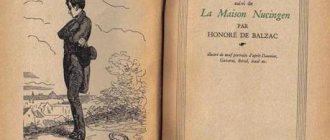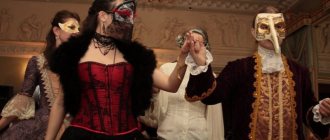Popular retellings today
- Emma - a summary of the novel by Jane Austen
A young girl Emma lives in a remote English village. She is the daughter of a wealthy landowner, Henry Woodhouse. Emma's mother died long ago and was replaced by the kind and sensitive governess Miss Taylor. - The White Duck - a summary of the fairy tale
The young prince got married, but he had to leave his wife. He ordered her not to go out and not to talk to anyone. - The melon grower - a summary of Sholokhov's story
In Sholokhov's story “The melon grower” it tells about a guy Mitka who works as a melon grower. His family is small, he, his father, mother and older brother Fedor. Mitka's father is appointed commandant of the military court - The Notebook - a summary of the novel by Nicholas Sparks
Nicholas Sparks' novel "The Notebook" is a touching love story. The action takes place in a nursing home, where an elderly man reads an incredible love story from his notebook to an elderly woman.
Sartre “Flies” - summary
Sartre
- all works
Sartre
- essays on the work
Page: [ 1 ]
On the main square of Argos there is a statue of Jupiter covered with flies. Orestes enters, brushing off the big fat flies. Terrible screams are coming from the palace.
Fifteen years ago, Clytemnestra, mother of Orestes and Electra, and her lover Aeghiof killed their father Agamemnon. Aegisthus wanted to kill Orestes too, but the boy managed to escape. And now Orestes, brought up in distant lands, enters his hometown with curiosity.
Jupiter enters, disguised as a city dweller. He explains to Orestes that today is the day of the dead, and the cries mean that the ceremony has begun:
the inhabitants of the city, led by the king and queen, repent and beg their dead to forgive them.
Rumors are circulating around the city that Agamemnon’s son Orestes remained alive. By the way, Jupiter notes, if he had accidentally met this Orestes, he would have told him: “The local residents are great sinners, but they have embarked on the path of redemption. Leave them alone, young man, leave them alone, respect the torment they have taken upon themselves, leave in good health. You are not involved in the crime and cannot share their repentance. Your bold innocence separates you from them like a deep ditch.”
Jupiter is leaving. Orestes is at a loss: he does not know what to answer to the stranger, the city where he could rightfully be king is alien to him, he has no place in it. Orestes decides to leave.
Elektra appears. Orestes speaks to her, and she tells the stranger about her hatred of Clytemnestra and Egasthos. Electra is lonely, she has no friends, no one loves her. But she lives in hope - she is waiting for one person...
Queen Clytemnestra enters. She asks Electra to dress in mourning: the official repentance ceremony will begin soon. Noticing Orestes, Clytemnestra is surprised: travelers, as a rule, bypass the city, “for them our repentance is a plague, they are afraid of infection.”
Electra mockingly warns Orestes that publicly repenting is the national sport of the Argives; everyone already knows each other’s crimes by heart. And the queen’s crimes “are official crimes, lying, one might say, at the basis of the state structure.” Every year on the day of the murder of Agamemnon, people go to
a cave which is said to communicate with hell. The huge stone blocking the entrance to it is rolled aside, and the dead, “as they say, rise from hell and disperse throughout the city.” And the residents prepare tables and chairs for them, and make beds. However, she, Electra, is not going to take part in these stupid games. These are not her dead.
Elektra leaves. Following her, wishing Orestes to quickly get out of the city, Clytemnestra leaves. Jupiter appears. Having learned that Orestes was about to leave, he offers him a pair of horses at a reasonable price. Orestes replies that he has changed his mind.
People crowd in front of a closed cave.
Aegisthus and Clytemnestra appear. The stone is rolled away, and Aegisthus, standing in front of the black hole, addresses the dead with a repentant speech. Electra suddenly appears in a blasphemous white dress. She calls on residents to stop repenting and start living simple human joys. And let the dead live in the hearts of those who loved them, but do not drag them to the grave with them. Page 1 ]
On the main square of Argos there is a statue of Jupiter covered with flies. Orestes enters, waving away the big fat flies. Terrible screams are coming from the palace. Fifteen years ago, Clytemnestra, mother of Orestes and Electra, and her lover Aeghiof killed their father Agamemnon. Aegisthus wanted to kill Orestes too, but the boy managed to escape. And now Orestes, brought up in distant lands, enters his hometown with curiosity. Jupiter enters, disguised as a city dweller. He explains to Orestes that today is the day of the dead, and the cries mean that the ceremony has begun: the inhabitants of the city, led by the king and queen, repent and beg their dead to forgive them. Rumors are circulating around the city that Agamemnon’s son Orestes remained alive. By the way, Jupiter notes, if he had accidentally met this Orestes, he would have told him: “The local residents are great sinners, but they have embarked on the path of redemption. Leave them alone, young man, leave them alone, respect the torment they have taken upon themselves, leave in good health. You are not involved in the crime and cannot share their repentance. Your bold innocence separates you from them like a deep ditch.” Jupiter is leaving. Orestes is at a loss: he does not know what to answer to the stranger, the city where he could rightfully be king is alien to him, he has no place in it. Orestes decides to leave. Elektra appears. Orestes speaks to her, and she tells the stranger about her hatred of Clytemnestra and Egasthos. Electra is lonely, she has no friends, no one loves her. But she lives in hope - she is waiting for one person... Queen Clytemnestra enters. She asks Electra to dress in mourning: the official repentance ceremony will begin soon. Noticing Orestes, Clytemnestra is surprised: travelers, as a rule, bypass the city, “for them our repentance is a plague, they are afraid of infection.” Electra mockingly warns Orestes that publicly repenting is the national sport of the Argives; everyone already knows each other’s crimes by heart. And the queen’s crimes “are official crimes, lying, one might say, at the basis of the state structure.” Every year on the day of the murder of Agamemnon, people go to a cave that is said to communicate with hell. The huge stone blocking the entrance to it is rolled aside, and the dead, “as they say, rise from hell and disperse throughout the city.” And the residents prepare tables and chairs for them, and make beds. However, she, Electra, is not going to take part in these stupid games. These are not her dead. Elektra leaves. Following her, wishing Orestes to quickly get out of the city, Clytemnestra leaves. Jupiter appears. Having learned that Orestes was about to leave, he offers him a pair of horses at a reasonable price. Orestes replies that he has changed his mind. People crowd in front of a closed cave. Aegisthus and Clytemnestra appear. The stone is rolled away, and Aegisthus, standing in front of the black hole, addresses the dead with a repentant speech. Electra suddenly appears in a blasphemous white dress. She calls on residents to stop repenting and start living simple human joys. And let the dead live in the hearts of those who loved them, but do not drag them to the grave with them. Here the boulder that blocked the entrance to the cave rolls down with a roar. The crowd freezes with fear, and then rushes to deal with the troublemaker. Aegisthus stops the angry townspeople, reminding them that the law prohibits punishment on the day of the holiday. Everyone leaves, only Orestes and Electra are on stage, Electra is burning with a thirst for revenge. Having opened up to his sister, Orestes begins to persuade her to give up revenge and leave with him. However, Electra is adamant. Then, wanting to win the love of his sister and the right to citizenship in Argos, which smells of carrion, Orestes agrees to “take a grave crime onto his shoulders” and rid the inhabitants of the king and queen, who force people to always remember the atrocities they have committed. In the throne room of the palace there is a creepy, bloody statue of Jupiter. Orestes and Electra are hiding at its foot. Flies swarm around. Clytemnestra and Aegisthus enter. Both were mortally tired of the ceremony they had invented. The queen leaves, and Aegisthus turns to the statue of Jupiter with a request to grant him peace. Orestes jumps out of the darkness with a drawn sword. He invites Aegisthus to defend himself, but he refuses - he wants Orestes to become a killer. Orestes kills the king and then rushes into the queen's room. Electra wants to hold him - “she can’t hurt him anymore...”. Then Orestes goes on his own. Electra looks at the corpse of Aegisthus and does not understand: did she really want this? He died, but her hatred died with him. Clytemnestra's cry is heard. “Well, my enemies are dead. For many years I rejoiced in advance at this death, now a vice has squeezed my heart. Have I really been deceiving myself for fifteen years?” - asks Electra. Orestes returns, his hands are covered in blood. Orestes feels free, he has done a good deed and is ready to bear the burden of murder, since this burden contains his freedom. Swarms of fat flies surround the brother and sister. These are the Erinyes, the goddess of remorse. Electra takes her brother to the sanctuary of Apollo in order to protect him from people and flies. Orestes and Electra sleep at the foot of the statue of Apollo. The Erinyes danced around them. Brother and sister awaken. Like huge dung flies, the Erinyes begin to awaken. Looking at his sister, Orestes discovers with horror that overnight she has become remarkably similar to Clytemnestra. And this is not surprising: she, like her mother, witnessed a terrible crime. Rubbing their paws, the Erinyes circle around Orestes and Electra in a frantic dance. Electra regrets what he did, Orestes persuades his sister not to repent; in order to feel completely free, he takes full responsibility upon himself. Entering Jupiter pacifies the Erinyes. He is not going to punish Orestes and Electra, he just needs a “drop of repentance.” Jupiter convinces Electra that she did not want to kill, she just played murder all the time as a child, because this game can be played alone. Electra seems to be beginning to understand herself. Jupiter asks Orestes and Electra to renounce their crime, and then he will place them on the throne of Argos. Orestes replies that he already has the right to this throne. Jupiter notices that now all the inhabitants of Argos are waiting for Orestes near the exit from the sanctuary with pitchforks and clubs. Orestes is alone, like a leper. Jupiter demands that Orestes admit his guilt, but he refuses. Jupiter himself created man free. And if he didn’t want this crime, then why didn’t he stop the punishing hand at the moment the crime was committed? This means, Orestes concludes, there is neither good nor evil in heaven, “there is no one there who could command me.” ; Freedom for Orestes means exile. Orestes agrees - every person must find his own path. Jupiter silently moves away. Electra leaves Orestes. As soon as she steps onto the circle, the Erinyes attack her, and she calls out to Jupiter. Electra repents, and the Erinyes retreat from her. The Erinyes focused all their attention on Orestes. The doors to the sanctuary swing open, revealing an angry crowd ready to tear Orestes to shreds. Addressing the townspeople, Orestes proudly declares that he takes responsibility for the murder committed. He took it upon himself for the sake of the people: he took upon himself the crime of a man who could not cope with his burden and shifted responsibility onto all the inhabitants of the city. The flies must finally stop oppressing the Argives. Now these are his flies, his dead. Let the townspeople try to start living again. He leaves them and takes all the flies with him. Orestes leaves the circle and moves away. The Erinyes rush after him screaming.
Related materials:
- A. Saint-Exupery “The Little Prince” summary - .
- “The Death of Vazir-Mukhtar” Tynyanov - summary - .
- “Pushkin” by Tynyanov - summary - .
- “Kyukhlya” Tynyanov - summary - .
- “The Bachelor” Turgenev - summary - .





